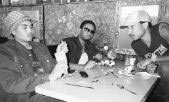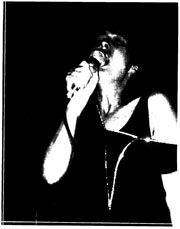N.E.R.D., SPYMOB
Showbox, 628-3151, $15 adv. / $17 7 p.m. Wed., June 12
WHEN WAS THE LAST time you planned to polish your air guitar skills for a hip-hop show? Yeah, few folks ever do. But Chad Hugo hopes you’ll grind that imaginary ax when you see his rocked-out hip-hop crew N.E.R.D.
“You can’t do that when you listen to a [rap] beat,” Hugo says. “The only thing you can do is bob your head.”
Hugo knows beats. And you likely know his beats, too—the ones he’s created with partner Pharrell Williams as the Neptunes. Tune in to any Top-40 station and you’re as likely to hear their productions as you are Phil Spector’s on an oldies outlet: Nelly’s “Hot in Herre,” Mystikal’s “Shake Ya Ass,” Britney’s “I’m a Slave 4 U,” ‘N Sync’s “Girlfriend,” not to mention their work on songs by Jay-Z, ODB, Kelis, and Janet Jackson.
And, of course, you can hear further beat building on “Rock Star” by N.E.R.D. (pronounced “en-ee-are-dee”), the band Hugo and Williams formed with MC Shay, a friend from the duo’s native Virginia.
Last year, they recorded a debut titled In Search Of . . . adorned with their signature sound: minimalist, skittering beats, snare drums so trebly they’re almost brittle, and lots of space for MCs to move in.
Then they ditched it.
Well, sort of. The trio rerecorded In Search Of . . . with the help of funk band Spymob. Just a few changes spun the album into another realm entirely. Instead of anorexic percussion, they layered on live drums packed with more beef than a Wendy’s delivery truck. Elsewhere, they pushed aside synth sounds in favor of Sabbath-sized guitars.
But Hugo’s surprisingly blas頷hen describing the challenges of making the revised record and taking a live group out on the road to support it.
“It’s not like we planned this to be a rock ‘n’ roll-type band thing,” he says from his Virginia Beach home base a day before heading to the studio to complete a new Justin Timberlake track. “Originally, this was a concept Steely Dan-type studio soundtrack-to-your-life album. But to promote it, sure—we can make some dates. Sounds like fun.”
Fellow Neptune Williams presents N.E.R.D. (an acronym for No One Ever Really Dies) as hip-hop’s progressive alternative.
“The outstanding rule with us is ‘Follow Your Spirit,'” he writes in the band’s bio, sounding suspiciously like an Oprah devotee. The group has garnered a reputation for working outside rap’s ho’s ‘n’ hustlin’ norm, hailed for the sociopolitical sentiments of cuts like “Lapdance”—wherein cash hungry politicians are compared to strippers—and for dropping lines like “I don’t wanna be another cocaine story” (“Provider”).
“You’ll look at us,” Williams writes, “and say, ‘Wow, he really said that? They’re not really held down by the gun-slinging, ball-grabbing, Mercedes Benz-driving shit.'”
Still, the band isn’t above venturing into less enlightened lyrical territory. In “Rock Star,” N.E.R.D. brag, “My .44 pops far,” one of several obvious gat glimpses on the disc. Then there’s the staccato thumper “Brain.” “Do I really even love you, or do I really love your brain?” they rap, as if a woman’s mind is something utterly removed from her booty. After a while, it becomes clear it’s not exactly brains the band are after—it’s head. The tune offers an update of classic rock ‘n’ roll raunch, along with a Mick Jagger couplet for the new millennium: “It’s cool to call me dog/But your head is under my paw.”
Despite all this, Hugo insists there’s always been a spiritual element to the Neptunes’ work. “We all went to church when we were kids. I still go and stuff, but it’s not like we’re on a crusade. [The name] ‘No One Ever Really Dies’ just applies to people who try to make their mark on the world. Everyone has a certain mark—it doesn’t matter if it’s big or small, it’s a mark. You do have an effect on people.”
If they were never to touch another mixing console again, the Neptunes have already left an indelible imprint on modern music. For his part, though, Hugo says he doesn’t plan to stop anytime soon. Things are just starting to get exciting.
“For a while, music making was a fast-food type of industry. People could go through a drive-thru and say [affecting WASP-y accent], ‘I would like one pop song, one rock song, and a side order of metal.’ And then the record companies would spit it out, all packaged nicely,” he offers.
“I think they’re realizing now, ‘Hey, there’s lots of people out there who do listen to music that’s not on the radio. There’s a lot of people that do watch MTV2 and download interesting music. They may be smarter than we thought.'”








